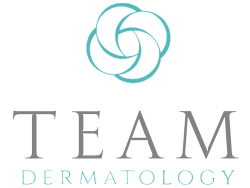
The best chemical peels for hyperpigmentation, be it melasma, age spots, or post-inflammatory hyperpigmentation, are gentle peels. They reveal smoother, brighter skin underneath without causing excessive irritation or worsening dark spots.
If you’re looking for a Houston chemical peel treatment, Dr. Asra Ali is a board-certified dermatologist in Houston, TX, specializing in chemical peels for all skin types, including hyperpigmented and sensitive skin. Book an online consultation with Dr. Ali to get a personalized peel treatment.
In this guide, we discuss the chemical peel options that Dr. Ali recommends if you have hyperpigmented skin.
Table of Contents
What is Hyperpigmentation?
Hyperpigmentation happens when patches of skin appear darker than the rest. It’s caused by excess melanin, often from sun exposure, hormonal changes, or skin injuries. People with darker skin tones are more prone to hyperpigmentation because they naturally produce more melanin. Hormonal changes, acne-prone skin, and frequent sun exposure can also increase your risk.
Types of Hyperpigmentation
These are the common types of hyperpigmentation to the face:
Melasma
Melasma appears as dark, blotchy patches, often on the face. It’s usually triggered by hormonal changes (like pregnancy or birth control) or sun exposure. Melasma is more common in women and people with darker skin tones.
Sunspots
Also known as age spots or liver spots, sunspots are flat, dark patches caused by years of sun exposure. They often show up on areas exposed to the sun, like the face, hands, shoulders, and chest.
Post-Inflammatory Hyperpigmentation (PIH)
PIH develops after the skin heals from an injury, acne, or irritation. It shows up as dark spots or patches in the affected area. This type of hyperpigmentation is common in people with acne-prone or sensitive skin and can take time to fade without treatment.
How Do Chemical Peels Treat Hyperpigmentation?
Chemical peels treat hyperpigmentation by targeting the layers of your skin where excess melanin builds up. The active ingredients in the peel exfoliate dead skin cells and speed up skin cell turnover, revealing smoother, more even toned skin.
Some peels, like those with glycolic or lactic acid, go deeper to regulate melanin production, helping fade dark spots over time. They also stimulate collagen, improving your skin’s texture and overall clarity. With the right peel, you can reduce hyperpigmentation and achieve a brighter, more radiant complexion.
What Chemical Peel is Best for Hyperpigmentation?
Hyperpigmented skin needs extra care when using chemical peels. Gentle peels work best to avoid irritation, and the peel’s strength should match how deep your pigmentation goes. Over-exfoliation can also make things worse.
This is why you need a dermatologist like Dr. Ali, who understands hyperpigmentation very well and can customize your peel treatment based on your needs. These are the chemical peel treatments that Dr. Ali recommends if you are struggling with hyperpigmentation:
Mandelic Acid Peel
Mandelic acid is very gentle and ideal for sensitive or darker skin tones. It works slowly, which lowers the risk of irritation or worsening hyperpigmentation. This peel is great for surface-level issues like mild sunspots or acne scars and leaves your skin looking smoother and more even.
Lactic Acid Peel
If your skin is dry or combination, a lactic acid peel might be the one for you. It gently exfoliates while locking in hydration, so your skin won’t feel stripped. Lactic acid works well for mild to moderate discoloration, leaving your skin brighter and more refreshed.
Glycolic Acid Peel
Glycolic acid goes a little deeper, making it a good choice for stubborn dark spots or uneven tone. It breaks up clusters of melanin and boosts collagen production, so you’ll see smoother skin and a more even complexion. If you have sensitive skin, Dr. Ali can adjust the strength of the peel to make it safer for you.
TCA Peel (Trichloroacetic Acid)
For deeper pigmentation like melasma, a TCA peel is a powerful option. It removes multiple layers of skin to target discoloration at its root. The results can be dramatic, but it’s a stronger peel, so professional application and aftercare are a must.
Are Chemical Peels Safe for Sensitive Skin?
Yes, chemical peels are safe for sensitive skin when chosen carefully and performed by a board-certified dermatologist like Dr. Ali. Mild peels like lactic acid or mandelic acid are often recommended because they’re gentle and less likely to cause irritation.
It’s important to consult with a licensed provider who can assess your skin type and recommend the right peel. Pre-treatment care, such as hydrating and avoiding harsh products, also plays a big role in minimizing sensitivity.
Is Chemical Peel Good for Acne Prone Skin?
Yes. In fact, chemical peels are a very popular treatment for acne-prone skin. Peels with salicylic acid or glycolic acid are great options as they exfoliate dead skin cells, unclog pores, and reduce inflammation. They can also target acne scars and help even out your skin tone.
For sensitive, acne-prone skin, lighter peels are ideal to avoid over-drying or irritation. Always work with a qualified skincare professional to choose the right type and strength for your needs.
Dr. Asra Ali – Your Houston Chemical Peel Expert
Dr. Asra Ali is a board-certified dermatologist and a skin expert in Houston, TX, specializing in chemical peels for all skin types, including hyperpigmented, sensitive, and acne-prone skin. She personalizes every treatment to ensure it’s safe, effective, and tailored to your needs.
Want smoother, glowing skin? Book your consultation with Dr. Ali at the Team Dermatology. Team Dermatology serves patients in Houston and Sugar Land, TX and surrounding areas, including Memorial, Katy, Conroe, Cypress, Pearland, The Woodlands, and Spring.
Frequently Asked Questions
What is the best chemical peel for me?
- It depends on your skin type and goals. Dr. Ali will recommend the right peel for you during your consultation.
Will chemical peels remove scars?
- Yes. Chemical peels can reduce the appearance of scars by promoting skin cell turnover and stimulating collagen. Deeper scars may require multiple treatments or additional therapies.
How much does a chemical peel cost in Houston?
- Chemical peel costs in Houston typically range from $150 to $600, depending on the type and strength of the peel. Book an appointment with Dr. Ali to get a personalized cost estimate.

